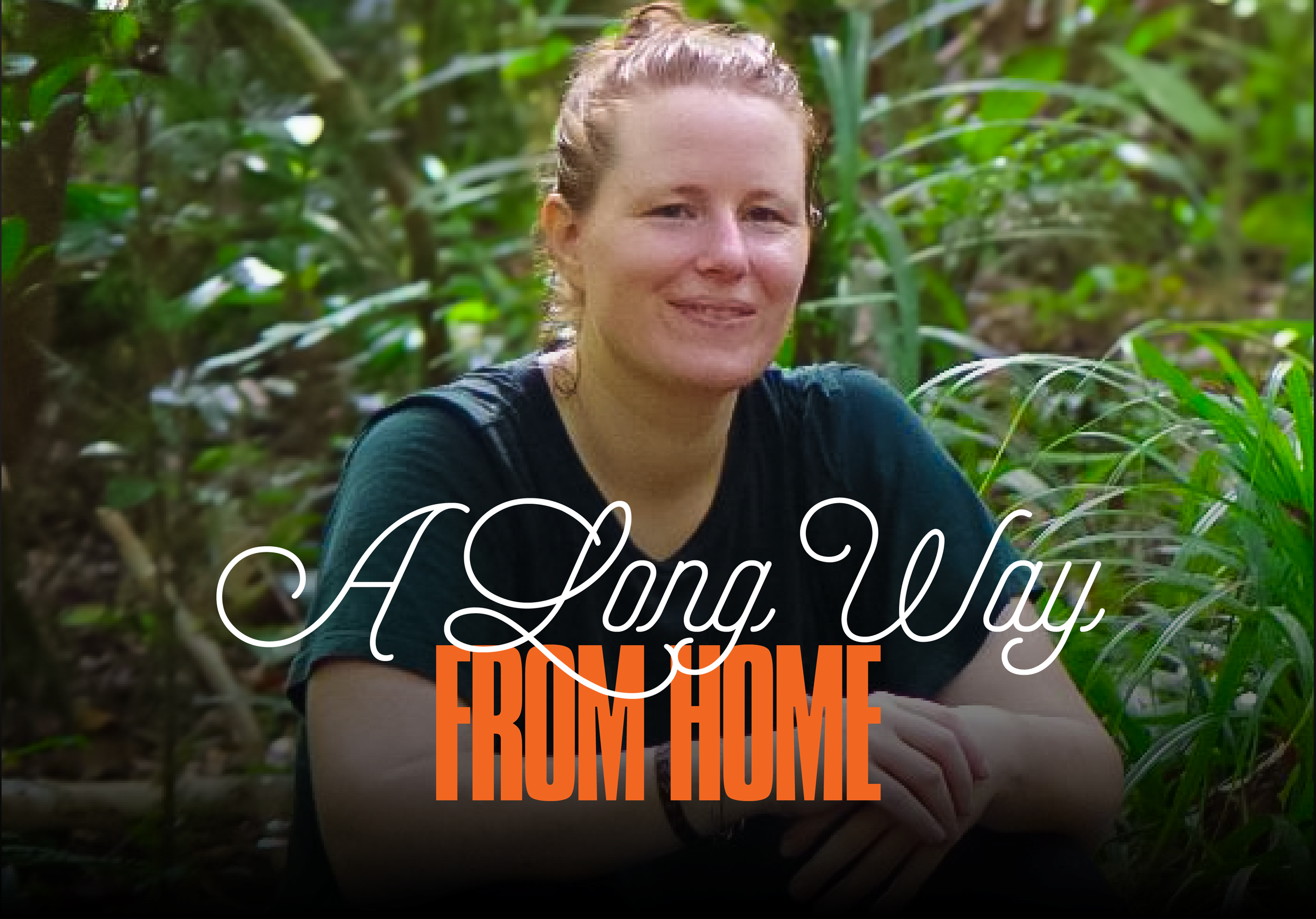“We mustn’t allow ourselves to be duped or succumb to a cognitive dissonance whereby we just switch off from it. We have to care because ultimately it will all come back to us.”
Ruth, PhD Candidate & Researcher
Photo by Ruth
I’m in Indonesia conducting PhD research into whether we can improve the methods for counting orangutans in the wild. Counting them by sighting alone is extremely difficult since they're semi-solitary and just really hard to find, so the way it’s done currently is by counting the nests orangutans make almost every night. That said, counting a proxy for an animal like nests is difficult too, and there's all these factors involved that make it unreliable as a method. It gives you a huge plus and minus, so if you look online for the population of remaining orangutans, you’ll get numbers anywhere from 35,000 to 120,000. My research involves data collection in the National Park to see if we can find a better way to do it. We’ve been counting nests, but in plots, and using a thermal drone to try to actually count orangutans instead of their nests. I’m testing the capabilities of the technology, and if it works, we’ll be able to buy drones and teach people how to fly them.
Arriving here was mind-blowing. It's an incredible community that has dedicated their lives to saving the park and the animals. The Dayak people are genuine and good-hearted, and they care very much for their elderly, their pets, and other people. I found them very similar to my family, lots of joking around, even when heavy stuff is happening. If someone wants to say something, they just say it and then the next minute they're fine again. I consider them my family now.
I see the struggles that they are going through; literally a daily slog of things I would never have expected, horrible things. Dr. Galdikas and the local people, are just trying to put out fires figuratively and literally, to do what they can. This is their life. They live here, they can't escape it. They're just in it. They're 100% in it.
Photo by Ruth
Coming here I was just a random nobody student with no skills from the same university where Dr Galdikas teaches. She just said, “sure, come and volunteer” and opened the door for me. I had no idea what I was doing. I didn't speak any Indonesian. I was totally an empty-headed white girl. I just knew I wanted to help. So now I try to do whatever I can to raise funds in Canada and help as much as I can. I'm super privileged to be able to do that.
There’s so much knowledge in the Dayak people that hasn’t been translated to the outer world, or that maybe wouldn’t even make sense to other people.
They understand deeply about the forest and the connections, what the animals and the birds are doing, like that the cicadas go off at three o’clock exactly, which is how they used to tell time. It’s being lost with all these concrete homes and motorbikes and Tiktok, but it’s still there. With OFI we’re trying to value that knowledge and the people that are still holding to that traditional way of living, and showing them that there is a way to make a living and save the forest at the same time.
The future of the orangutans, the forest, and Dayak culture are intertwined and can’t exist without each other, that’s for sure. The people can’t live without the forest, the fruit, the things they collect, and all the non-timber products that they get from it. On the other hand, it’s complicated because although the Dayak people are very close with the orangutans, they’re also hunters, their focus is not naturally on saving orangutans, and some in the interior even eat them. There are no more bats or big birds in this village because the Dayak people have hunted them all for food or medicine. It’s hard to tell them not to.
The connection they have with nature is magical, but it doesn’t always translate to breaking their cultural traditions.
I think about the forest all the time. It’s just incredible, the amount of life in there, from the tiny to the huge things, the biodiversity of trees, the interdependency of everything. Saving the forest is what motivates me above all, because if we can’t save the forest, then we can’t have orangutans, or bears, or all the things that live in it, and that’ll just be a real damn shame. We’ll be losing thousands of years of synchronicity.
Photo by Ruth
After the first interaction with an Orangutan, I was captivated. They’re so much like us. They get jealous, they can laugh, and when you look them in the eyes, you can't help but think there's a person in there. You get to know them as individuals, their personalities, and that translates into empathy. As soon as you have an opportunity to be so close to them, it's hard to turn away.
You saw that speedboat with a cage in it go by the other day? That was Nova, a wild Orangutan that the guys at Camp Leakey reported had wounds on the back of its head, so our veterinarian went out to check on it. They give literally individual care for every single animal, from little babies all the way up to the big males. All of that is from the 100% focus of Dr Galdikas. I've been very lucky to learn the value of an individual from her, and it’s passed down to all the people here who also understand the importance of that mindset. If an Orangutan is injured, looks sick, or is just acting unusually, we get the vets to look at it. It’s funny, everyone thinks, “If Ibu knew that we didn't call the vets, she'd be mad.” In conservation, some people have a ‘sink or swim’ attitude, talking about “populations matter” or “species matter”, and sure, those are important, but I'm a scientist and if you look at it, evolution occurs at the level of whether an individual lives or dies, and whether its traits get passed down. To care about the continuation of the species, you have to care about the individuals.
To care about the continuation of the species, you have to care about the individuals.
Orangutans actually live on the very edge of existence in this crazy feast and famine style. Even though there is enormous biodiversity in the forest, it’s not always a happy Garden of Eden. Sometimes there is nothing fruiting and they literally eat bark for six months at a time, chewing on trees, scraping the inner Cambium out to get sustenance. Dr Erin Vogel and her team recently published research looking at the proteins in their urine and found that orangutans are sometimes so starving that they go into somatic catabolism, meaning their muscles start to break down. They’re just skin and bone, with these big bellies full of gas from eating things their bodies are not designed to process. They spend all day looking for food and because there’s not enough to eat, there can’t be groups of them together. At other times, like right now, they’re fat and their hair is gorgeous ‘cause they’ve been eating nothing but fruit for five months, so much so that they become picky about what they eat. In times of abundance they can be more social with each other.
Photo by Ruth
Orangutans, especially the males, have evolved to roam across huge ranges to find food in times of scarcity. That’s why having less and less forest is extra bad because not only are we losing key trees that they survive on in low seasons, with less forest, they get crammed into areas where there’s limited food. They’re not used to living in such high densities, and it means they have to compete and fight for food, which expends vital energy.
That’s why Dr. Galdikas continually emphasizes that corridors between patches of forest are super important, particularly for the males who will naturally disperse.
If they run into a palm oil plantation, it’s basically 50-50 if they survive and make it through to something on the other side. Dr. Ketut, one of the OFI veterinarians, spends a lot of his time rescuing orangutans that are trying to find their way to the next patch but end up in plantations, or go to people’s houses looking for food.
A lot of time and energy is spent transporting them away from where people are, but it’s not a sustainable solution. Releasing them is a huge challenge too. We know they’re going to move, so we have to put them somewhere far from each other and far from humans. That range of locations doesn’t exist, except for right in the middle of the national park, but we can’t put 200 of them all in one place.
I’d urge people to think about how we live, what we are consuming and how what we do in Canada or Germany or China impacts other places, people, and biodiversity. The corporations don’t want us to know where things come from, but we mustn’t allow ourselves to be duped or succumb to a cognitive dissonance whereby we just switch off from it. We have to care because ultimately it will all come back to us. We’re seeing it already, with fires and climate change, and eventually all the forest and the orangutans will be gone. I have hope though. I think there are enough people that care, that if we keep spreading the word, and keep fighting the fight, we will be able to save some of what we have left.
More Stories









